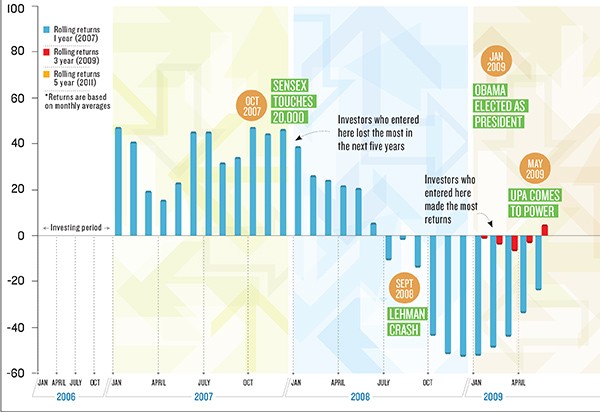Why Most Investors Don t Make Money In The Stock Market
Post on: 14 Май, 2015 No Comment

by Silicon Valley Blogger on 2008-01-03 34
So you want to make money in the stock market? The best way to start out is to educate yourself about investing, and the most favorable way to do this is to partake of free investment and trading resources from the best online brokers around. I wholeheartedly believe that knowledge is power.
However, heres a reality that many people dont realize that the average investor may not be doing too well with their stock investments. There could be a variety of reasons for this here are some of the thought patterns that people have about investing:
- Personal beliefs: The stock market is for gamblers!
So given all these tendencies, what kind of results does the average investor yield?
The Average Investors Scorecard
#1 Investor Performance
The sobering fact is that the typical equity mutual fund investors portfolio has lagged inflation from 1984 to 2003, while barely beating inflation over the last couple of decades, according to a study done by Dalbar, a Boston investment research company. Numbers tracked from 1986 through 2005 show:
- The average investor earned 3.9% a year, before taxes!
- Inflation grew 3.0% a year.
- The S&P 500 ($INX) earned 11.9% a year.
- The average equity mutual fund returned 9.3% a year.
These points are representative of the information provided by The Skilled Investor, who wrote about a formal study made from 1991 through 1997 that showed that most individual investors handled their investments poorly. Interestingly, these seem to mirror the casual, empirical data Ive previously gathered.
On average, the portfolios of investors in this study held four stocks in 1991 and seven in 1997. About 25% of accounts held only one stock, and about half held one or two stocks. On a risk-adjusted basis, this lack of diversification was quite costly to these investors. When compared to the broad market portfolio, 80% to 90% of these investors portfolios underperformed the market over the period of the study.
#2 Investor Knowledge
What else do we know about the average investor? Now the National Association of Securities Dealers (NASD) also conducted a survey that tested the knowledge of 1,086 investors whove made at least one investment in the past and whose portfolios ranged from $10,000 to $500,000. Not bad numbers! Still, the results were very surprising. The survey covered some basic investing and financial questions and here were some unexpected findings:
Assumptions: Over two-thirds of the survey respondents (69%) admitted to being at least somewhat knowledgeable about investing with only 12% believing they were not at all knowledgeable. 60% owned stocks and 60% claimed they owned mutual funds.
- Almost half of the respondents believed that stocks are insured against losses.
Most interesting of all were the overall takeaways from the study:
Only 35% of respondents scored a passing grade on the NASD survey. 97% admitted they needed to be better educated about investing. The NASD did provide a breakdown on which groups fared best in its survey. The notable findings are:
- older respondents (50+) did better than younger (21-29) respondents
- men did better than women
- higher income ($100,000 and greater) did better than lower income (less than $50,000)
- primary decision-makers did better than shared decision-makers
Whats quite telling here is how the average investor actually underperforms the average mutual fund, most likely because of the investors common behavior of switching from one fund to another, chasing returns while buying high and selling low. If instead we stay put with a given investment, wed be tracking that investments performance and perhaps have a better chance of matching benchmark returns.
Given the kind of showing weve seen in the knowledge test, I suppose its easy to understand why the average investor holds a portfolio that has returned 3.9% over the last 20 years or so.
Explaining Poor Market Performance
So why are most people unable to make money in the markets? Ill boil it down to a few reasons: lack of information, inexperience and arrogance. The stock market can eat you alive when you havent studied it enough and you decide to jump in without much understanding. The stock market may also humble you if you think youre way too smart for it and decide to embark on the quest to beat it year after year.
Ive decided Id like to make money in the markets with the least amount of work possible, and a diversified portfolio of index funds should do the trick. No rocket science here, but unfortunately, too many of my buddies just dont buy it.
Additional Reading:
2001 Dalbar Study: Quantitative Analysis of Investor Behavior Report
2003 Dalbar Study: Market Chasing Mutual Fund Investors Earn Less than Inflation
2004 Dalbar Study: DALBAR Study Shows Market Timers Lose Their Money
2007 Dalbar Study Quantitative Analysis of Investor Behavior Report
Image Credit: LewRockwell.com, IFA.com, Kimmunications (KimSnider.blogs.com), DonandJenny.com














